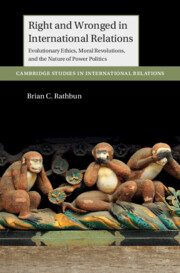 Right and Wronged in International Relations
Right and Wronged in International Relations Book contents
- Right and Wronged in International Relations
- Reviews
- Cambridge Studies in International Relations: 163
- Right and Wronged in International Relations
- Copyright page
- Dedication
- Contents
- Figures
- Tables
- Acknowledgments
- 1 The Nature in and Nature of International Relations
- 2 Lesser Angels
- 3 Mankind Is What Anarchy Makes of It
- 4 See No Evil, Speak No Evil?
- 5 To Provide and to Protect
- 6 Just Desserts in the Desert
- 7 Barking Dogs and Beating Drums
- 8 Biting the Bullet
- 9 Dying in Vain
- 10 Daily Bread
- 11 From Demonizing to Dehumanizing
- Index
- Cambridge Studies in International Relations: 163
5 - To Provide and to Protect
A Dual-Process Model of Foreign Policy Ideology for a Dangerous or Competitive World
Published online by Cambridge University Press: 29 July 2023
- Right and Wronged in International Relations
- Reviews
- Cambridge Studies in International Relations: 163
- Right and Wronged in International Relations
- Copyright page
- Dedication
- Contents
- Figures
- Tables
- Acknowledgments
- 1 The Nature in and Nature of International Relations
- 2 Lesser Angels
- 3 Mankind Is What Anarchy Makes of It
- 4 See No Evil, Speak No Evil?
- 5 To Provide and to Protect
- 6 Just Desserts in the Desert
- 7 Barking Dogs and Beating Drums
- 8 Biting the Bullet
- 9 Dying in Vain
- 10 Daily Bread
- 11 From Demonizing to Dehumanizing
- Index
- Cambridge Studies in International Relations: 163
Summary
Recent advances in moral and social psychology have made clear that political ideology has moorings in the same moral foundations thought to have evolutionary roots. A number of different scholars have converged on what Duckitt has labeled a “dual-process model” of political ideology, a two-dimensional framework for explaining the fundamental cleavages in politics. The first dimension captures binding morality, driven by a motivation to protect from threats. The second dimension captures a motivation to provide for others’ welfare, which defines virtue as taking care of others. Since there is no autonomous political sphere, however, we project these same cleavages onto foreign policy. I present evidence from two American and one Russian surveys showing that the two-dimensional models of foreign policy belief systems found to structure foreign policy attitudes in the United States and other countries have moral roots. Militant internationalism, our beliefs about the necessity of carrying a big stick and being willing to use it, are strongly associated with binding moral values, our motivation to protect. Cooperative internationalism, our beliefs about the gains to be had from cooperation and our obligations to others outside our own borders, is strongly associated with the moral motivation to provide.
- Type
- Chapter
- Information
- Right and Wronged in International RelationsEvolutionary Ethics, Moral Revolutions, and the Nature of Power Politics, pp. 128 - 148Publisher: Cambridge University PressPrint publication year: 2023
